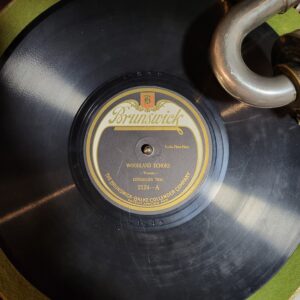Table of Contents
Brunswick Records, with its roots in cabinetry and craftsmanship, found its true calling in the world of music, becoming a pivotal player in the 78rpm era. This label wasn’t just a business; it was a cultural hub, a place where diverse musical genres and groundbreaking artists found a home.

Jazz, the heartbeat of the 20s and 30s, found one of its most influential platforms at Brunswick. Duke Ellington, a name synonymous with the jazz era, was one of the label’s stars. His groundbreaking compositions like “Mood Indigo” weren’t just music; they were masterpieces that helped define the genre.
In the realm of blues, Brunswick was ahead of its time, recognizing the raw, emotional power of artists like Bessie Smith. Her soulful voice and poignant lyrics on tracks like “Nobody Knows You When You’re Down and Out” captured the essence of the blues, leaving a lasting impact on the genre.
Brunswick’s reach extended beyond jazz and blues. The label played a significant role in introducing and popularizing country and folk music, genres that would later evolve into modern Americana. This foresight showed Brunswick’s commitment to diversity and its ability to foresee trends in the musical landscape.
Classical music also found a voice at Brunswick. The label’s venture into this genre showcased its versatility and respect for all forms of music, bringing operatic and classical masterpieces to a wider audience.
In essence, Brunswick Records was more than a label; it was a melting pot of sounds and styles. It was a place where musical legends were made, and genres were shaped. The legacy of Brunswick lies not just in the records they produced but in the cultural shifts they influenced through their eclectic and visionary approach to music.
From a technical perspective, one of Brunswick’s most notable contributions was the development of their own recording technique, known as the “Brunswick Method.” This method was a significant leap forward in capturing and reproducing sound with greater fidelity. At a time when the quality of recorded music was often limited by the technology available, Brunswick’s approach allowed for a richer, more dynamic sound.
Another significant technical innovation by Brunswick Records during the 78rpm era was the creation of a versatile tone-arm that revolutionized the way phonographs could be used. This inventive tone-arm was designed to accommodate not just one, but three types of record grooves: the conventional lateral cuts, the vertical cuts used in Pathe records, and the distinct diamond disc format of Edison records.
Before this innovation, phonograph users often faced the limitation of compatibility with different record formats, which was arguably the first true format war. Brunswick addressed this challenge head-on by developing a tone-arm that could seamlessly switch between these formats, allowing one console the ability to play multiple record types. A modern analogy would be one console which could play both Betamax and VHS.
Brunswick was not just a record label; it was a trailblazer that left an indelible mark on the music industry. During the golden age of the 78rpm record, Brunswick was at the forefront, not only in terms of the diverse array of artists and genres it represented but also in its technological advancements that forever changed the landscape of audio recording and playback.
